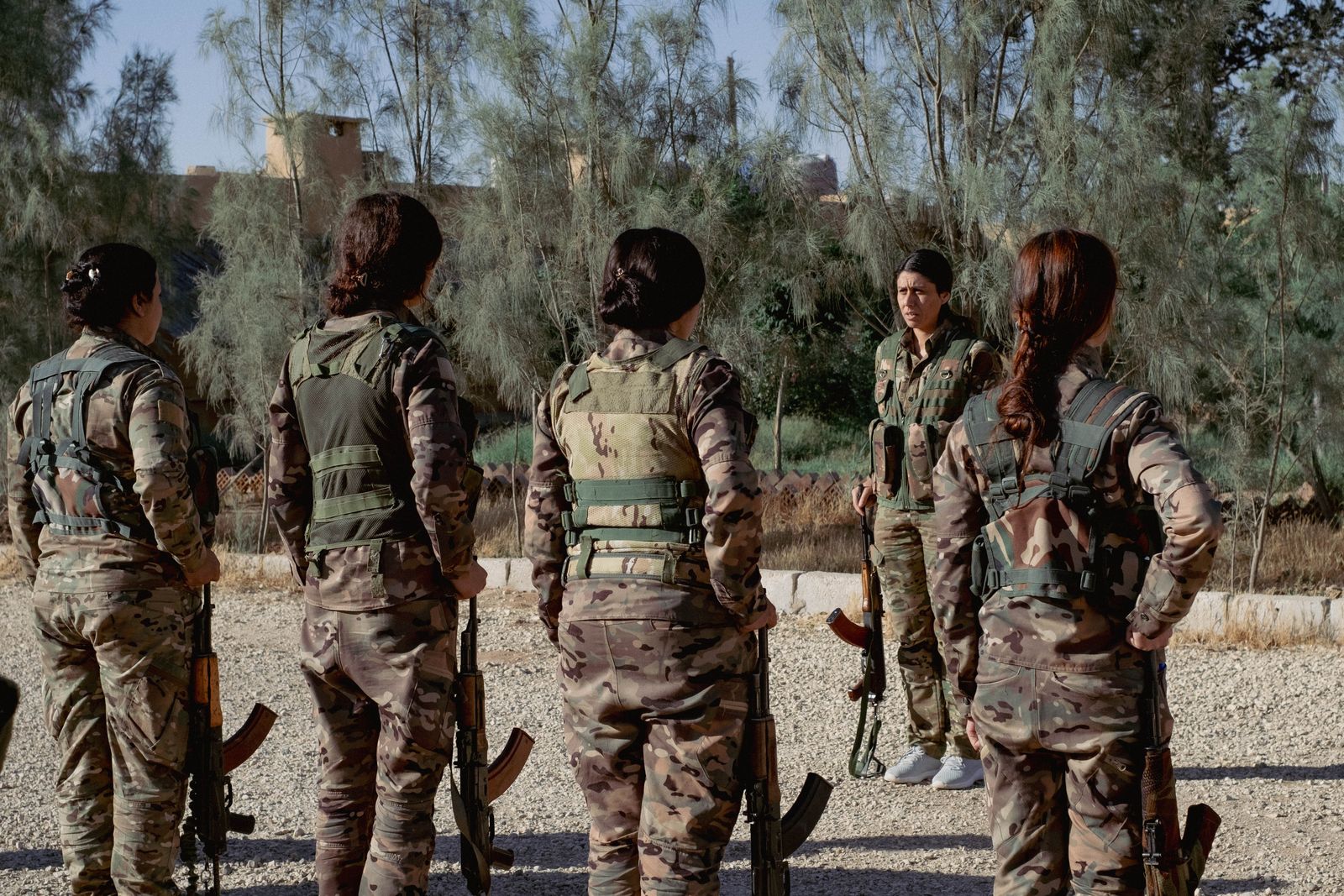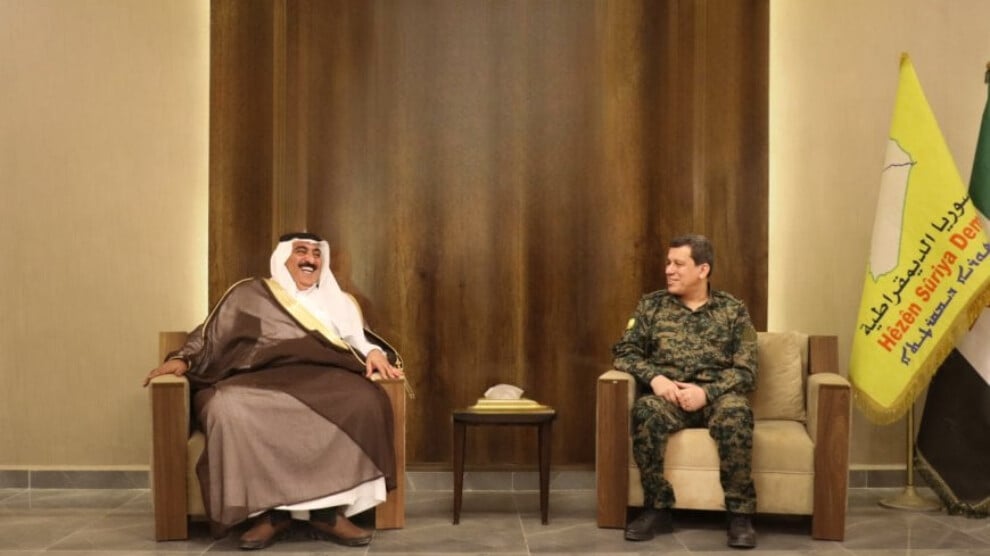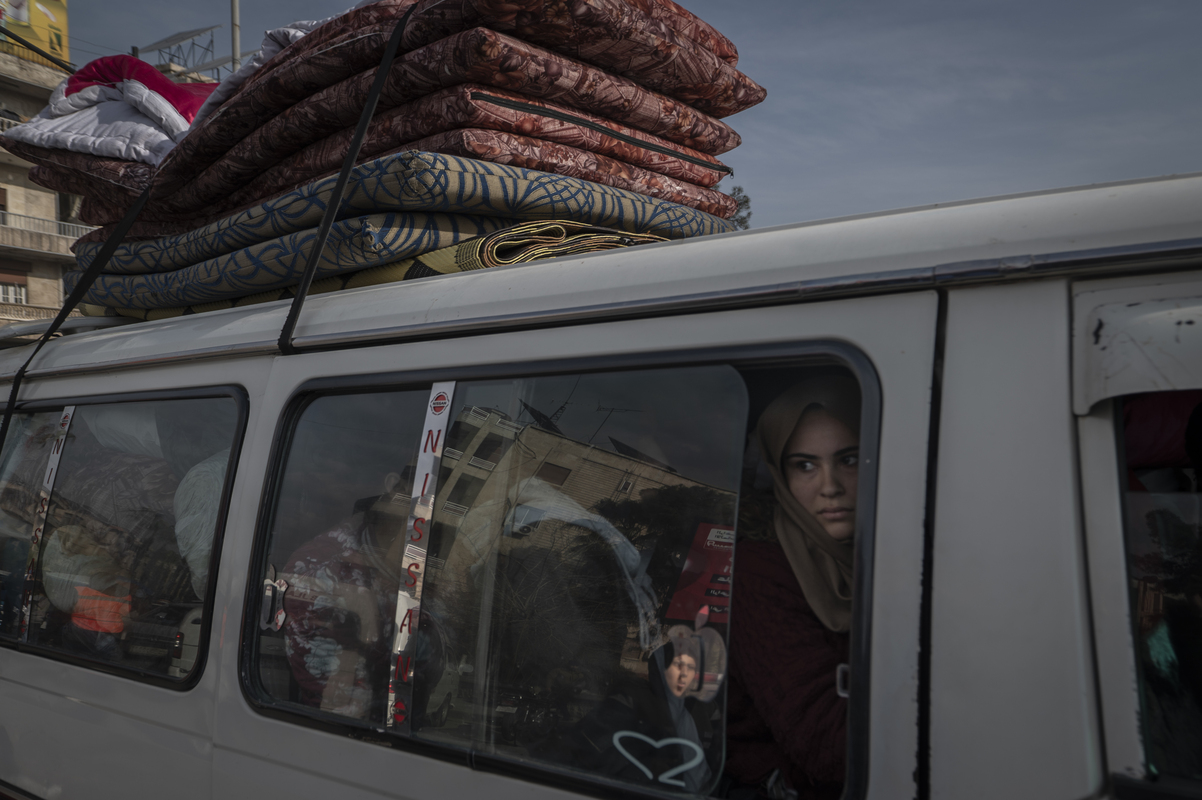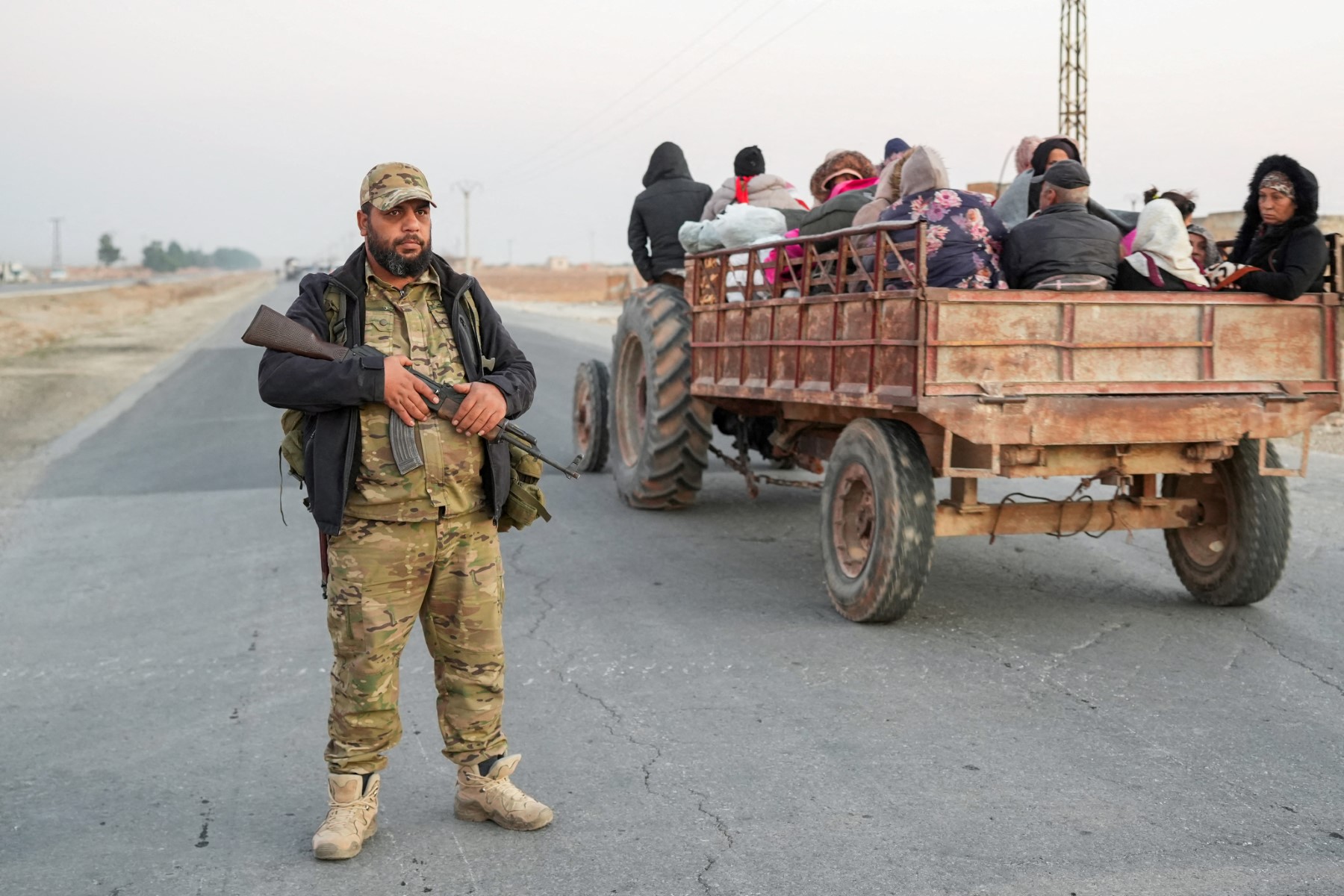The YPJ refuse to disarm in Syria

Photo by Alexandra Henry
Cover Photo by Alexandra Henry
Now integrated into the Syrian Democratic Forces (SDF), the Kurdish women fighters of the YPJ stand at the heart of a burning political dilemma. Between Turkish pressure, institutional deadlocks, and deep mistrust from Damascus, their future remains uncertain. Their integration into the unified security apparatus demanded by the new Syrian government and part of the international community appears increasingly unlikely. On the ground, they refuse to lay down their arms, driven by the memory of their fallen comrades, a powerful vision of emancipation, and the unshakable belief that their struggle is far from over.
It was a little over ten years ago: as the Islamic State (ISIS) swept across the Levant, thousands of Kurdish women took up arms in northeastern Syria. Enlisted in the Women’s Protection Units (YPJ) — the female counterpart to the People’s Protection Units (YPG) — they joined the fighting and, sometimes in spite of themselves, became global symbols of resistance.
Since then, much has changed: ISIS has lost its so-called caliphate, the regime of Bashar al-Assad has fallen, and the Kurdistan Workers’ Party (PKK) — the ideological cradle of their movement — has announced its dissolution. Now, the YPJ seem to stand at a crossroads. Somewhere in the Syrian desert, at a base once controlled by ISIS, a battalion of around fifty women fighters from the YPJ has set up camp. Some are seasoned combatants, others less so. But all recently took part in the battle for Tishrin, where they fought pro-Turkish militias from the Syrian National Army (SNA) for over four months, between December and March.
It was a bloody confrontation — more than 600 people were killed, including around a hundred Kurdish fighters — over control of a strategic dam on the Euphrates, in northeastern Syria. The stakes were high: had the SNA seized the dam, Kobanê risked being surrounded once again, ten years after ISIS.
Siajine, 22, is from this martyred city. She was just a child when ISIS laid siege to Kobane, but she carries memories that will stay with her for life.
“The attacks came closer every week. ISIS fighters were right outside, and sometimes rockets would fall on my neighborhood. My family and I had to flee. I’ll never forget those scenes of chaos, people desperately searching for their loved ones, everyone disoriented. We didn’t know where to go, which roads were safe.”
As a symbol, ten years later, it was in Tishrin that she fought her first battle. “I stayed there almost throughout the entire duration of the fighting. We lived hidden in tunnels built near the dam, because Turkish drones and fighter jets were bombing. Regularly, we would come up to carry out assaults against the SNA.”
But despite the repeated battles, it is a more personal wound that Siajine carries with her: the loss of a childhood friend, killed on the front line. The two had been inseparable in Kobane. “We were fascinated by the YPG and YPJ. We promised each other that one day, we would join them.”
A promise kept, but cut short by war. “My best friend was killed in combat five years ago. It was the biggest shock of my life. We studied together, we were neighbors, we grew up side by side… She was torn away from me. But I haven’t forgotten our promise. I want her, and all our martyrs, to live through us. I want to keep fighting for her. So that her death has meaning.”
Like Siajine, most of the fighters we met in this remote corner of the Syrian desert described an enlistment rooted in remembrance. Amara, 23, from Hassakeh, joined the YPJ in 2021. In the beginning, she says she was hesitant and unsure of herself: “I didn’t really know what I was doing. I was afraid of bullets. Carrying weapons was hard. I often doubted myself. But something kept pushing me forward.”
That ‘something,’ she can now name clearly: the death of her brother in Deir ez-Zor in 2024, killed by a Turkish drone strike. She pauses for a moment, then continues: “He was a year older than me. He meant everything to me. It’s something I say often our fight is a form of revenge. I think of him every day.”
But for many of these women, the commitment goes beyond personal grief, it reflects a deeply political awakening: “For decades, men controlled society, and women were under their authority. A woman always depended on a man. Here, I realized another life was possible. That we were capable of something else. I didn’t know I had rights. The education classes—about who we are, what we’re meant to do—all of that helped me find my voice. I’ve freed myself ”, Amara says.
And even though the spotlight on Kurdish women fighters faded after the war against ISIS ended, she says she has no doubt about the recognition women like her receive around the world:
“Millions of people are proud of us. Proud of our struggle. We’re protecting our people. That allows me to be proud of myself. We know we’re also fighting for others.”
But for many of these women, the commitment goes beyond personal grief—it reflects a deeply political awakening. “For decades, men controlled society, and women were under their authority. A woman always depended on a man. Here, I realized another life was possible. That we were capable of something else. I didn’t know I had rights. The education classes, about who we are, what we’re meant to do, all of that helped me find my voice. I’ve freed myself,” insists Amara.
And even though the spotlight on Kurdish women fighters faded after the war against ISIS ended, she says she has no doubt about the recognition women like her receive around the world: “Millions of people are proud of us. Proud of our struggle. We’re protecting our people. And that allows me to be proud of myself. We know we’re also fighting for others.”
Like her comrades, she confides she has no trust in the new authorities in Damascus: “When Jolani took power, we knew his men had blood on their hands. Their Islamic rhetoric made us wary. But we wanted to believe in change. We hoped they would grant women the same rights as everyone else. We thought we saw some positive signs. Then, in March, came the massacre of the Alawites. That was a shock. And after them, the Druze… How can we not imagine that Kurdish people, and women, will be the next targets?”
“We will not lay down our arms”
Vian Adar, a YPJ commander, is unwavering: “Almost every Kurdish family has members serving in the security forces. It’s become almost a societal phenomenon. A new generation of young people, both girls and boys, is now following in the footsteps of their elders who fought ISIS. They won’t give up their weapons so easily, not when Syria’s future is still so uncertain.”
This woman in her fifties, a veteran of the war against ISIS, says she is now fighting just as much to ensure that future generations won’t have to endure the same suffering. “We’ll do everything in our power to move the conversation forward, to shift the lines—even if it’s difficult. We are Syrian women, whether we wear the YPJ uniform or not. We protected people here, and we will keep doing so elsewhere, anywhere in this country.”
Still, another actor seriously complicates the equation: Turkey. In May, Recep Tayyip Erdoğan reiterated that the YPG and YPJ—considered by Ankara as direct offshoots of the PKK—must be dismantled, just like their parent organization, which officially announced its own dissolution a few weeks earlier.
Inside the barracks, these statements are met with anger. On the walls, portraits of Abdullah Öcalan, the imprisoned ideological leader of the PKK, hang beside those of numerous female fighters killed by Turkish bullets or drone strikes.
“It’s absurd,” says Vian Adar. “Yes, we follow the ideology of Abdullah Öcalan. That doesn’t mean we are part of the PKK.” In her view, Turkey’s declarations are motivated by something else: “It’s about pressure from Syrian groups that are hostile to women,” she insists.
Another YPJ member, originally from Turkish-administered Kurdistan, takes a clearer stance: “The dissolution of the PKK is a good thing. We had reached the end of the road. The Kurdish and international context has changed. Victories have been won, especially here, in Syria.”
Still, she admits that the future of the YPJ now hinges on dynamics far beyond their control. “If our future were only about us and as Kurdish women, it would almost be simple. We know what we want, what our red lines are, what we’re willing to accept or not. But the problem is much bigger. The YPJ is part of a broader whole: that of Syrian women, in all their diversity. And within that context, our unit has to hope that solutions will be found.”
But these solutions have been slow to emerge. The March 2025 agreement—meant to integrate the Syrian Democratic Forces into the state apparatus—has stalled, and relations between Kurdish authorities and Damascus have continued to deteriorate. In recent weeks, clashes have been reported in several areas, including Manbij, Deir ez-Zor, and eastern Aleppo, pitting the SDF against the Syrian army.
There have been attempts at de-escalation: in early September, SDF representatives met with regime envoys in the northeast to calm tensions. “We know that Turkey is pressuring Damascus to push for our dismantling. Al-Charah is also under pressure from his radical base, which cannot fathom the idea of Kurdish women joining the national security forces,” explains a source within the YPG.
Behind the scenes, another major point of contention looms: the institutional question. In August, around 400 representatives from Syrian minority groups—Kurds, Alawites, and Druze—gathered in Hasakah at the initiative of Kurdish authorities. They called for a revision of the Syrian constitution to enshrine minority rights and lay the groundwork for a decentralized state. The integration of the Syrian Democratic Forces, including the YPG and YPJ, into the national security apparatus remains a political headache.
Vian Adar concludes: “We will fight this battle ideologically. I hope it becomes our main battlefield. As for our weapons, they are here to protect us. We have nothing against the idea of laying them down—if the situation allows. But we will not surrender them, even if the male fighters of the YPG do.”
Laurent Perpigna Iban
Amargi Columnist



